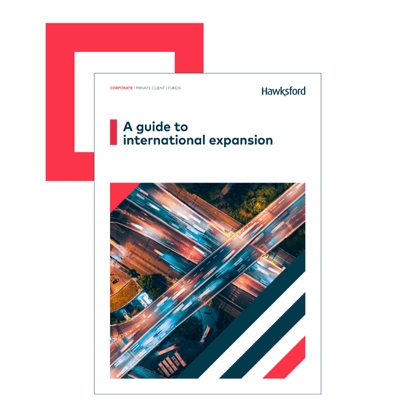Despite the challenges of a volatile global market, high interest rates and inflationary pressures, the UK continues to appeal to businesses with global growth ambitions. Rebecca Cox, Managing Director – UK at Hawksford, explores why the UK remains a key hub for supporting international corporate growth and how Hawksford is evolving to meet the shifting needs of clients…
Q: How have you seen the corporate services landscape evolve over the past year from a UK perspective?
Rebecca Cox (RC): There’s no doubt the UK remains a leader when it comes to providing professional and business services (PBS). In fact, according to the UK government, the PBS sector now employs 14% of the UK’s total workforce.
This reputation has been driven in no small part by the UK’s focus on innovation, particularly in relation to business process outsourcing. The combination of access to advanced professional skills and technological innovation in the sector is creating a fantastic platform for growth, for both incumbents and new entrants.
Over the past year, we’ve seen the industry continue to advance in three key areas. First, digital transformation through the adoption of advanced technologies such as cloud, AI and big data are enabling innovative companies to flourish. Second, business process innovation is improving productivity, simplifying processes, creating more resilient supply chains and increasing outsourced business operations. The UK has developed a solid position in this space. And third, the UK has consolidated its position for providing international professional services, enabled by free trade agreements and trading frameworks established by the UK government.
Q: What are the opportunities Hawksford’s London team is seeing?
RC: Our team is seeing real benefits from the global connectivity offered by the UK and London. It’s enabling us to serve a large and growing pool of international clients.
Diversity has been the watchword over the past 18 months. We’ve seen new clients come on board from a real breadth of jurisdictions – the US, Europe, Asia, as well as the Middle East. In addition, we’ve seen interest from a wide range of high potential, internationally mobile entrepreneurs, supporting them to scale and internationalise their business, using the UK as their global headquarters. Those businesses also span multiple sectors, from tech to retail to consumer. We’ve also had the opportunity to provide services to corporate venture capitalists, who have been looking to invest in high-value start-ups, growth companies and funds in the UK.
That greater diversity – both geographically and at a sector level – is really exciting for the UK and will give us good opportunities over the coming years.
Q: How is the firm’s UK strategy adapting in this dynamic environment?
RC: We’re continuing to evolve our UK proposition to not only support clients with their expansion plans into the UK, but to support them with their international expansion plans, using the UK as a global headquarters or hub.
This approach is increasingly important to clients – and it’s something we’re well placed to do, with a presence in 18 locations worldwide and the ability to set up legal entities in almost every jurisdiction globally. A joined-up cross-divisional approach also means we are able to provide services across not only the corporate space, but across the funds and private client sectors too.
For instance, we supported a cashmere company on its expansion into the UK in 2022 and following successful business growth the client is now looking at further expansion in other jurisdictions across Europe and Asia, all locations where Hawksford have presence and would be able to support the client. It is a good example of how we are able to offer a holistic proposition and practical solutions to clients, from the establishment of their business and meeting compliance obligations, opening bank accounts and providing director services.
Q: What sort of impact is London seeing in terms of current global geopolitical instability?
RC: Significantly, the UK is a highly open economy. It trades goods and services internationally, as well as financial assets. As a result, over recent months the macro environment has undoubtedly had an impact on the UK – both positively and negatively.
The inflationary environment, for instance, has meant that the cost of doing business in the UK has gone up and international businesses seeking to expand into the UK are having to ensure they have sufficient capital to do this.
On a more positive note, meanwhile, there has been greater potential for growth in UK exports, driven by foreign demand for UK goods and services. Furthermore, instability in other jurisdictions is prompting businesses to seek out stable locations for their expansion plans – and the UK is a good option, offering a stable platform that entrepreneurs and businesses can rely on.
Q: As well as acting as a magnet for investor capital, what role does London play as part of the wider global landscape?
RC: As well as attracting capital into the City, as a major global financial centre London also plays a key role acting as a global centre for the management of financial risk, and this plays a huge role in attracting ambitious growth businesses.
It benefits, for instance, from a strong network of 250 international banks, while the UK channels some 43% of global forex trading and 18% of international bank lending. That high volume of cross-border financial transactions is testimony to the UK’s capability to support multinational corporates in managing currency and liquidity risks on a global scale.
London also offers a good hub for controlling operational risks and supporting regulatory compliance, thanks to its impressive network of legal, tax advisory and corporate service providers, such as Hawksford.
Q: Looking forward, what will continue to make London so attractive for investors?
RC: The robust and business-friendly environment in the UK will continue to make it an attractive destination for businesses to expand, trade and invest.
That was reflected in certain measures included in the latest autumn budget announcement; the Full Expensing deduction becoming permanent, for instance, is expected to boost business investment by £14 billion and help grow the economy. There were also commitments to simplify research and development tax reliefs and the income tax cash basis for the self-employed and partnerships, underlining the UK’s desire to continue to hold its crown as a global tech and R&D hub, and welcome businesses of all sizes.
The UK, meanwhile, continues to have the lowest headline corporation tax rate in the G7, will now have following these announcements one of the most generous Capital Allowance Regimes in the world and amongst OECD group of major advanced economies.
Looking further ahead, the UK will need to continue its efforts when it comes to building closer cooperation with the EU and global economies on science, technology and regulatory issues to avoid losing out in a fragmenting global environment. If it can do this – and the indications are that it can – then London and the UK more widely will continue to offer an attractive environment for globally dynamic companies with ambitious growth targets.
For more information on the various types of company available in the UK, as well as the benefits of expanding into the market, read our guide 'Doing business in the UK'.

Speak to our experts today
Updated on



